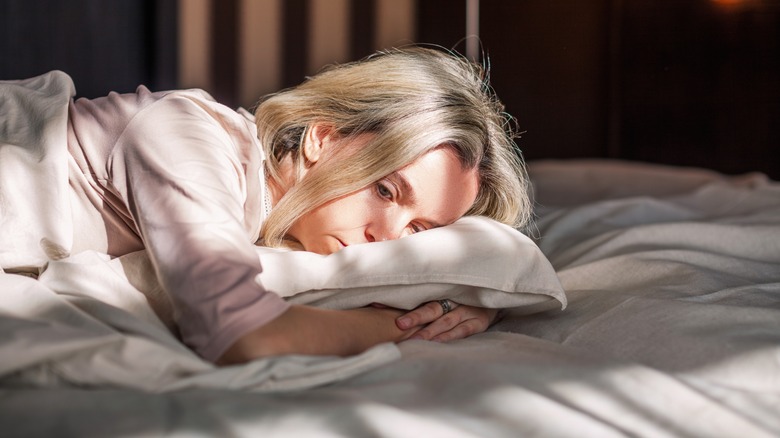Sleep patterns can impact health in a wide variety of ways, from , weight management, mood, and more (per Healthline). And in a new study, researchers have found an important link between sleep quality and glaucoma. According to the American Academy of Ophthalmology (AAO), previous smaller studies have indicated sleep duration, sleep disturbances, difficulty falling asleep, sleep disorders, use of sleep medication, and daytime sleepiness are all associated with having glaucoma.
Researchers in the new study agree, saying, “Snoring, daytime sleepiness, insomnia, and short/long duration, individually or jointly, were all associated with the risk of glaucoma. These findings underscore the need for sleep intervention for individuals at high risk of glaucoma as well as potential ophthalmologic screening among individuals with chronic sleep problems for glaucoma prevenheart and brain health to kidney functiontion” (via The Guardian).
The observational study could not establish a cause for the increased prevalence of glaucoma among subjects with sleep disturbances. However, researchers claim there are biological explanations for the associations found between glaucoma and poor sleep quality. Internal eye pressure is a critical factor in glaucoma development. They explained that lying down and imbalanced sleep hormones increase internal eye pressure, and both occur in insomnia.
Sleep disturbances may increase the risk for glaucoma

The new study, published in the BMJ Open, looked at data from 409,053 people in the U.K. who were admitted to a hospital with a glaucoma diagnosis. Researchers estimated the associations of normal sleep behaviors with abnormal sleep behaviors to assess the risk of glaucoma. Subjects who regularly slept between seven and nine hours per night were considered to have healthy sleep patterns, while sleeping less than seven hours or more than nine hours was regarded as abnormal. Researchers also considered whether subjects self-reported as “morning people” or not, along with the severity of insomnia symptoms, snoring, and the frequency of subjective daytime sleepiness.
Study results showed that snoring, insomnia, daytime sleepiness, and sleeping less than seven hours or more than nine hours were all linked with the risk of glaucoma. According to Medical Xpress, daytime sleepiness posed the most significant threat, increasing the risk of glaucoma by 20%. Insomnia upped the stakes by 12%, short or long sleep duration by 8%, and snoring by 4%. Thomas M. Kilkenny, M.S., D.O., director of the Institute of Sleep Medicine at Staten Island University Hospital, part of Northwell Health in New York, told Healthline that caffeine, blue light, and stress are major causes of sleep disturbances.
Kilkenny says, “Stress is one of the most common issues. Everyday living can [be] stressful, which can interfere with sleep quality. We all need a period of relaxation in the evening to wind down before sleep.”